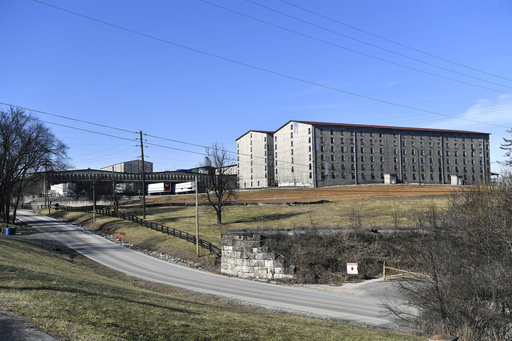
LAWRENCEBURG, Ky. — Nestled in the scenic hills of Kentucky, famous for its bourbon production, the specter of a looming trade war looms heavy, reminiscent of a persistent hangover.
Kentucky’s bourbon makers are once again at risk as potential targets for retaliation following President Donald Trump’s introduction of new tariffs aimed at the U.S.’s neighboring countries, Canada and Mexico. On Monday, discussions between Trump and the leaders of Canada and Mexico led to a temporary postponement of these tariffs for at least a month to foster further negotiations. However, the absence of a conclusive resolution has left some lawmakers and industry representatives apprehensive regarding the future of Kentucky’s celebrated spirit.
Exports of American whiskey witnessed a decline during a previous trade conflict in Trump’s first term. Prior to the announcement of a one-month pause, Canada retaliated against this latest wave of trade tensions with plans to impose tariffs on American imports, including alcoholic beverages. Certain authorities across several provinces had even considered removing American liquor brands from government-operated stores.
Each year, the bourbon sector contributes approximately $9 billion to Kentucky’s economy, generating numerous jobs and increasing tourism, according to a report published last year. Kentucky is responsible for producing 95% of the world’s bourbon supply, as highlighted by the Kentucky Distillers’ Association.
The bourbon industry serves as an economic lifeline for Lawrenceburg, situated near well-known distilleries like Wild Turkey and Four Roses. In this community, where support for Trump is strong, many residents express optimism that tariffs could serve as a bargaining tool in international negotiations. Lawrenceburg local Gary Chilton shared his thoughts while going about his daily routine, stating, “I think it’s time for our nation to stand up for our nation. And that’s what we’re doing right now. Other nations have taken advantage of us for so long.”
Contrarily, Kentucky’s Democratic Governor Andy Beshear cautioned in a video posted Sunday that tariffs could negatively impact working-class families in a state that overwhelmingly favored Trump in the previous election. He emphasized that the repercussions would extend beyond distilleries, impacting those from farming to barrel production, suggesting that the community’s support for Trump might wane if the tariffs materialize.
Republican U.S. Representative Andy Barr, whose district includes key bourbon production areas, expressed support for Trump amidst the growing uncertainty for the industry. “Other nations have forgotten that the United States is the world’s superpower,” Barr asserted, reinforcing his commitment to safeguarding the bourbon sector which he described as essential for job creation and economic prosperity.
Meanwhile, Republican U.S. Senator Mitch McConnell of Kentucky aired concerns on Monday regarding the potential ramifications of tariffs on employment and consumer prices, emphasizing his stance for fair trade practices without imposing additional burdens on American consumers.
The bourbon industry remains hopeful that rational discussions will prevail. The Kentucky Distillers’ Association praised Trump and the leaders of Mexico and Canada for the decision to hold off on tariffs for 30 days. Both neighboring countries have agreed to intensify efforts to enhance border security and tackle drug trafficking to appease Trump.
Eric Gregory, president of the distillers’ association, conveyed optimism for lasting agreements that would facilitate international enjoyment of Kentucky bourbon. Chris Swonger, president and CEO of the Distilled Spirits Council of the United States, stressed the need for the U.S. and Canada to forge a deal that supports both nations’ spirit industries, noting that many producers are caught in the crosshairs of the tariffs.
He explained that since bourbon and Tennessee Whiskey in the U.S., along with Canadian Whisky in Canada, are recognized as ‘distinctive products,’ their production cannot merely be transferred to different countries or regions.
Even before the latest trade disputes, American whiskey producers were facing challenges. The industry possesses a substantial stockpile of aging spirits ready for market release. Recently, the Kentucky Distillers’ Association reported that a historic 14.3 million barrels of bourbon are currently in storage, all while younger consumers seem to be drinking less.
Furthermore, a significant threat looms on the horizon from overseas, with the European Union poised to reinstate a hefty 50% tariff on American whiskey in late March if no preemptive actions are taken. Trump indicated on Sunday that these import taxes will likely materialize with the EU and potentially the United Kingdom as well, which could inflict severe damage to the already vulnerable American whiskey market.

